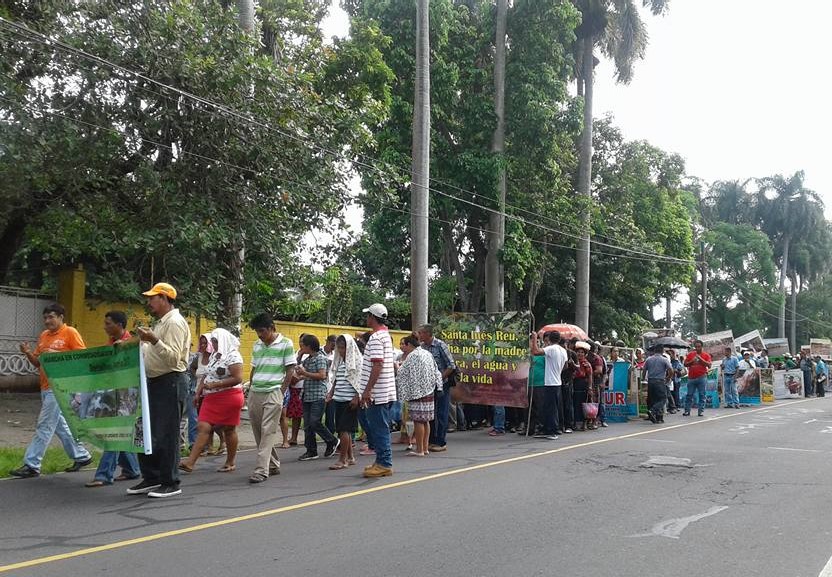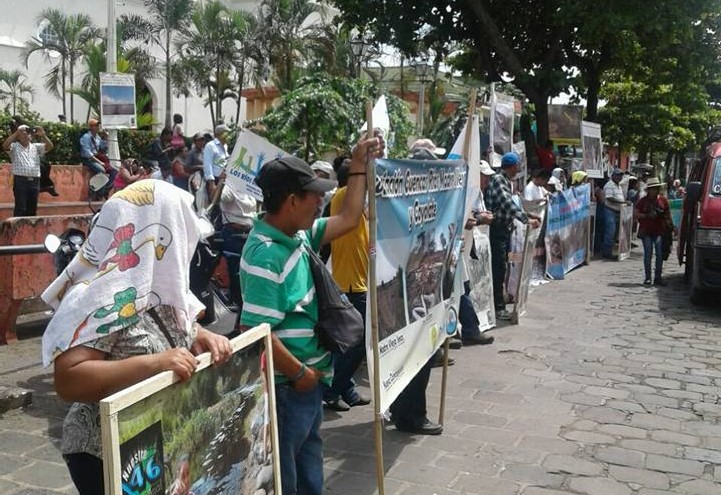Demonstrating for environmental and human rights in Guatemala
On June 5th, World Environment Day, community members at the southern coast of Guatemala protested against the rapid spread of large-scale palm oil, sugar cane and banana plantations in their region. Utz Che', our local partner organisation, joined the march.
Hundreds of women and men walked to the office of the regional government to share their concerns about the negative impacts of the plantations on the environment, on which they depend for their livelihoods. The communities have a shortage of water because rivers are diverted and dry up due to excessive water consumption by agro-industrial companies. In addition, rivers, the air and the crops of surrounding small farmers are contaminated by pesticides and chemicals.
"Government: Take Measures"
The communities therefore demand that the government take measures to protect human rights and to guarantee the right to water, food, health and a healthy environment. Further requirements of the population are that the agro-industry does not drill deep wells to pump up groundwater, the government prohibits the use of industrial chemicals and stops the expansion of large-scale monocultures, as it causes major damage to the locals population and the environment, whilst profits of these plantations only benefit the rich landowners.
Project to protect the river
The march was part of a project where Both ENDS works with Utz Che' to protect the Madre Vieja River. Several local communities depend on this river for fishing and for their water supply. The river is also an important water supplier for the mangrove forests on the coast.
The Madre Vieja-project consists of three elements: first, Utz Che's supports local communities to organize themselves, focusing mainly on women's participation. Although women suffer most from water shortage and contamination, they usually do not have a role in decision-making processes. In this project, therefore, much attention is paid to involving women in decisions and actions. Already, women have organized themselves to make their voice heard and claim their rights to a clean living environment.
Secondly, Utz Che', together with the Italian NGO Source International, conducts participatory scientific research into the effects of plantations on the river and the soil. The investigation looks at what human rights are being violated and helps the communities collect evidence in their struggle to defend their lands.
Thirdly, Utz Che' has entered a legal process to protect the river and enforce measures to stop the dehydration and pollution of the river. The research that is being done provides evidence for this process. The purpose of the legal process is not only to protect the Madre Vieja, but to create a precedent for other cases in which the agro industry causes damage to rivers in Guatemala.
Both ENDS supports Utz Che' financially, gives strategic advice and helps to map the production chain of the plantations: from financiers to buyers of palm oil and sugar. This way, all actors in the chain can be held accountable for violating international standards and laws designed to protect people and the environment.
More:
- Weblog by Anne: Guatemala: why the sugar is not so sweet
- Video by Utz Che' about the Madre Vieja-project (in Spanish)
 |
 |
Pictures by Utz Che'
Read more about this subject
-
 Dossier /
Dossier /Global Alliance for Green and Gender Action (GAGGA)
GAGGA rallies the collective power of the women's rights and environmental justice movements to realize a world where women can and do access their rights to water, food security, and a clean, healthy and safe environment.
-
 News / 8 maart 2019
News / 8 maart 2019Campaign "We, women are water" launched on International Women's Day
During the month of March, and as part of International Women's Day (March 8th) and World Water Day (March 22nd), the organizations that constitute GAGGA-Latin America, will lead a joint campaign called "We, women are water".
-
 Event / 22 maart 2023, 13:15 - 14:30
Event / 22 maart 2023, 13:15 - 14:30Making finance for gender just water and climate solutions a reality!
The UN Water Conference is an important event that brings together stakeholders from around the world to discuss water and climate solutions. This year, GAGGA is organizing a side event during the conference that you won't want to miss!
On Thursday March 23rd, from 1.15 -2.30 pm, GAGGA will present their commitment to support, finance, and promote locally rooted, gender just climate and water solutions within the Water Action Agenda. This event will inspire other stakeholders to join in their commitment, while presenting inspiring examples of such solutions presented by local women from Nepal, Kenya, Paraguay, Mexico, and Nigeria.
-
Publication / 15 maart 2023
-
 News / 8 maart 2021
News / 8 maart 2021GAGGA launches “We, Women are Water” campaign 2021
On International Women's Day (March 8th) the Global Alliance for Green and Gender Action (GAGGA) will launch the "We, Women are Water" campaign to highlight women's role, demands and actions in ensuring water security in the face of climate change.
-
 News / 23 maart 2020
News / 23 maart 2020Women in Latin America claim their right to water
In many places in Latin America, access to clean water is under great pressure from overuse and pollution, often caused by large-scale agriculture or mining. This has significant impact, especially on women. In March, with International Women's Day on March 8 and World Water Day on March 22, they make themselves heard and claim their right to water.
-
 Blog / 21 januari 2020
Blog / 21 januari 2020Oil palms, water and women: gender in the watershed
Photo Blog - Like many communities in Indonesia, life in Semanga Village, West Kalimantan, revolves around a river. The 90 or so houses follow the curving bank of the Sambas River, each with a path down to a small pontoon where fishing traps and baskets are stacked and boats are tied.
-
Publication / 2 november 2021
-
 News / 19 mei 2020
News / 19 mei 2020Women from the Niger Delta demand Shell to end pollution of air and water
Communities in the Niger Delta have been affected by air and water pollution due to Shell's activities for decades. This year, at Royal Dutch Shell's annual meeting, Kebetkache Women's Resource and Development Centre held Shell accountable for the consequences of their activities. Clean-up of oil spillages and ending gas flaring is becoming even more urgent in the fight against COVID-19, in which clean water is crucial to prevent the spread of the virus.
-
 News / 15 april 2022
News / 15 april 2022IDB stops funding for two controversial dams in Guatemala: ground-breaking decision
The Inter-American Development Bank (IDB) has taken a unique decision to withdraw from the construction of two controversial dams in Ixquisis, Guatemala. Both ENDS has supported our partner AIDA for many years in its fight against the dams. Tamara Mohr and Pieter Jansen explain why this decision is so exceptional.
-
 News / 5 november 2019
News / 5 november 2019Guatemalan women force Development Bank to investigate gender policy violations
After a complaint filed by women's groups from Ixquisis, Guatemala, the Interamerican Development Bank (IDB) has started an investigation on several policy violations, amongst which the Gender Equality policy. This is a unique chance to create a precedent, because complaints on the IDB's gender policy are very rare. The women from Ixquisis are fighting for their rights with support of the Global Alliance for Green and Gender Action (GAGGA).
-
 News / 7 augustus 2018
News / 7 augustus 2018Indigenous women fight dams in Guatemala
Communities from Northern Guatemala have filed a complaint this week against the Inter-American Development Bank (IDB). They bear the brunt of the construction of two large hydropower dams in the Ixquisis region, that are co-financed by the IDB. This is against the bank's own policies on environment and sustainability, indigenous people, gender, and information disclosure.
-
 Video / 12 september 2018
Video / 12 september 2018Water defenders
Latin American partner organizations of GAGGA launched the campaign "We, women, are water" in March 2018. This video was launched as part of this campaign, and emphasizes the role of women water defenders.
-
 Video / 12 september 2018
Video / 12 september 2018Water is a common good
The Latin American partner organizations of GAGGA launched the campaign "We, women, are water" in March 2018. This video was launched as part of this campaign, and emphasizes the importance of recognizing water as a common good.
-
 Video / 12 september 2018
Video / 12 september 2018Women are water
Latin American partner organizations of GAGGA launched the campaign "We, women, are water" in March 2018. This video was launched as part of this campaign, and emphasizes the role of women in the sustainable management of water in Latin America.
-
 Blog / 4 april 2024
Blog / 4 april 2024If we women don't speak up, no one will speak for us
By Maaike Hendriks and Tamara MohrThis February women environmental defenders from around the world met each other in Indonesia. All these defenders face structural violence. GAGGA, the Global Alliance for Green and Gender Action, supports these women. This meeting in Indonesia provided a unique space for women, trans-, intersex and non-binary people who are often the subject of conversation but rarely have the opportunity to engage with each other and meet other defenders from around the world. For they are all amazingly knowledgeable, strong and resilient women whom we should take seriously.
-
 Event / 3 november 2021, 13:15 - 14:30
Event / 3 november 2021, 13:15 - 14:30UNFCCC COP 26 side event 'Gender-just climate finance: from barriers to actionable solutions'
With gender-responsiveness a work in progress, current climate funds are hardly accessible for women-led community based organizations. While these groups lack access to finance and decision-making, they already lead bold holistic gender-just climate solutions and initiatives worth funding support.
Follow this event live on YouTube!
-
 News / 3 juni 2020
News / 3 juni 2020Green light for FGG and GAGGA!
Last Friday, 29 May, it was announced that both the Fair, Green and Global Alliance (FGG) and the Global Alliance for Green and Gender Action (GAGGA) have been selected as two of the 20 potential strategic partnerships of the Dutch Ministry of Foreign Affairs for the 2021-2025 period. Both ENDS is pleased that the Dutch government is seriously considering extending its support to these networks, as they show that cooperation on the basis of equality between grassroots organisations and NGOs throughout the world can continue to bring about change in the position of women, in respect for human rights and in making trade chains and financing systems sustainable.
-
 External link / 31 mei 2018
External link / 31 mei 2018Harnessing the power of the women’s rights and environmental justice movements (Annual Report 2017)
It was minus 20 degrees Celsius when 2.000 women gathered at the main square of Ulaanbaatar, Mongolia, to voice their distress about the terrible smog in the city caused by three large power plants. Soon after, the women were invited to speak about the problem of air pollution with the minister of environment.
-
 News / 8 maart 2018
News / 8 maart 2018Only 0.2 % of all foundation funding for women & environment
Women around the globe are at the forefront of addressing the impacts of climate change and environmental degradation, designing, implementing, and scaling up their own solutions. Socially defined gender roles often position women and girls as stewards of the physical, economic, and cultural well-being of their communities.







